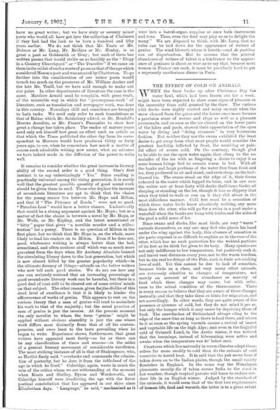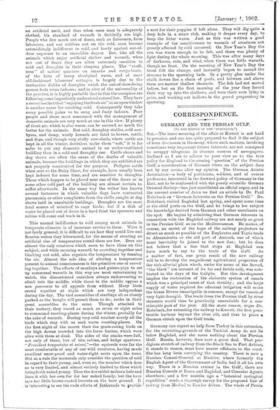THE EFFECT OF COLD ON ANIMALS.
WHEN the frost broke up after Christmas Day the water fowl, which had been frozen out for a week, might have been expected to show some signs of pleasure at the immunity from cold granted by the thaw. The various wild ducks were highly excited and noisy enough when the snow cleared from the grass and the lawns once more became a provision store of worms and slugs as well as a pleasant promenade, and as soon as the ice cleared on the lower parts of the lakes and pools, showed their appreciation of the open water by diving and " doing steamers " in very boisterous fashion. But neither they nor the swans exhibited the least desire to get away from what most people would consider the greatest hardship inflicted by frost, the numbing or pain- ful effect of severe cold. On the contrary, though glad to be-able to use the open water again, they clung to the re. mainder of the ice with as lingering a desire to enjoy it as some human beings feel to remain warm in bed. With all the banks and large portions of the water free from frost and ice, they preferred to sit and stand, and even sleep, on the half- thawed ice. The swans stood on the edge of it, their forma reflected in the water which lapped its brim, and in one case the writer saw at least forty wild ducks (half-tame birds) all sleeping or standing on the ice, though it was so slippery that when they tried to walk or run on it they slid about in the most ridiculous manner. Cold feet must be a sensation of which these water birds know absolutely nothing, any more than does the otter, who will go for a swim in a pool under a waterfall when the banks are hung with icicles and the sides of the pool a solid mass of ice.
Since swans and ducks, like most birds, are . very " warm " animals themselves, as any one may feel who places his hand under the wing against the body, this absence of sensation in the parts exposed is as difficult to explain as in the case of the otter, which has no such protection for the webbed portions of its feet as its thick fur gives to its body. Many species are not only indifferent to low temperature, but positively seek it, and travel vast distances every year, not to the warm tundras, but to the real ice-fringe of the Pole, such is their astonishing love of cold. Yet this cannot be due to lack of sensation, because birds as a class, and .very many other animals, are extremely sensitive to changes of temperature, not merely on account of the abundance or scarcity of food which these changes may cause, but with refer. ence to the actual condition of the thermometer. There is every reason to believe that they are aware of these changes instantly, and that they take them as hints for migration, and act accordingly. In other words, they are quite aware of the presence or absence of cold, but they do not mind it per se, but only the hunger which it may cause by depriving them of food. The snowfinches of Switzerland always cling to the edge of the snow-line as long as there is food there, and return to it as soon as the spring warmth causes a revival of insect and vegetable life on the high Alps ; and even in the frightful cold of Grinnell Land, in the Arctic winter, it was noticed that the lemmings, instead of hibernating, were active and awake when the temperature was 441.' below zero.
Creatures which live naturally in warm climates adapt them- selves far more readily to cold than do the animals of cold countries to torrid heat. It is said that the yak never lives if taken down on to the Indian plains, though the small variety flourishes in England. In the same way the Himalayan pheasants usually die if taken across India to the coast in hot weather, though tropical parrots will learn to endure out- door life in an English winter. Judged by the standard of the animals, it would seem that of the first two requirements of human life, food and warmth, the latter is to a great extent an artificial need, and that when once man is adequately clothed, his standard of warmth is decidedly too high. People who live much out of doors, such as fishermen, farm labourers, and our soldiers out on the veld, soon become astonishingly indifferent to cold, and hardy against out-of- door exposure to an incredible degree. But, like all the animals which enjoy artificial shelter and warmth, when not out of doors they are often extremely sensitive to cold and draughts in their sleeping places. The " stuffi- ness" of sailors' quarters on smacks and cargo-boats, of the huts of many aboriginal races, and of most old-fashioned labourers' cottages, is largely due to the instinctive dislike of draughts which the out-of-door-living person feels when indoors ; and in view of the universality of the practice, it is highly probable that in this the occupiers are following some imperfectly understood natural law. They have a secret instinct that " enjoying the fresh air" at an open window is another name for catching cold. Consequently they take every possible pains to be snug and fusty indoors. Poor people and those most concerned with the management of domestic animals are very much at one in this view. If plenty of fresh air, which is also warm, can be secured, so much the better for the animals. But cold, draughty stables, cold cow- byres, and damp, windy kennels are fatal to horses, cattle, and dogs, and though very stuffy cow-sheds, where cattle are kept in all the winter, doubtless make them "soft" it is far safer to put any domestic animal in an under-ventilated building than in a cold and draughty one. Cattle shows and dog shows are often the cause of the deaths of valuable animals, because the buildings in which they are exhibited are not properly constructed for the purpose. Pedigree cattle when sent to the Dairy Show, for example, have usually been kept indoors for some time, and are sensitive to draughts. Those which happen to be placed near one of the doors or in some other cold part of the building are almost certain to suffer afterwards. In the same way the writer has known several instances in which valuable dogs have contracted pneumonia or other complaints from the chills „caught at dog shows held in unsuitable buildings. Draughts are the most fatal source of mischief to cage birds ; but if a dish of water be placed out of doors in a hard frost the sparrows and robins will come and wash in it.
This normal indifference to cold among most animals in temperate climates is of immense service to them. Were it not fairly general, it is difficult to see how they could live and flourish unless they hibernated, for the means of creating an artificial rise of temperature round them are few. Bees are almost the only creatures which seem to have ideas on this subject, and while securing warmth by crowding together and blocking out cold, also regulate the temperature by fanning the air. Almost the sole • idea of altering a temperature present to animal consciousness is the primitive one of crowd- ing together. The efforts of monkeys and guinea-pigs to set up communal warmth in this way are most entertaining to watch, the discontented outsiders always endeavouring to climb into the middle, while those in the middle oppose a non possumus to all appeals from without. Many birds crowd together at night which are very independent during the day. The vast assemblies of starlings sit as closely packed as the boughs will permit them to do; rooks in their great assemblies do the same. Though attached to their rookery, they travel as much as seven or eight miles to communal roosting-places during the winter, probably for the sake of warmth. During very cold weather nearly all the birds which stay with us seek warm roosting-places. On the first night of the recent thaw the grain-eating birds on the high downs crowded into the furze bushes, which were alive with them at dusk. The sides of the stacks were full, not only of these, but of tits, robins, and hedge sparrows. "Provident lempestates et sciuri,"—the squirrels were far the most comfortable of any of our wild creatures, having made excellent snow-proof and water-tight nests upon the trees. But as a rule the mammals only consider the question of cold in regard 'to their young, and, even so, the number which does so is very limited, and almost entirely limited to those which bring fcrth naked young. Thus the doe rabbit makes a hole and lines it with her own fur for her naked family, but the hare lays her little brown-coated leverets on the bare ground. It st interestirg to see the rude efforts of fcgilNunds to provide a nest for their puppies if left alone.. They will dig quite a deep hole in a straw rick, making it deeper every lay, to keep the litter warm. Just as this was written a good example of the sensitiveness to warmth of creatures not greatly affected by cold occurred. On New Year's Day the sun was warm enough to be felt, and there was plenty of light during the whole morning. This was after many days of darkness, rain, and wind, when there was little warmth, though no frost. On the morning of New Year's Day the trout felt the change, and instantly began to ascend the streams to the spawning beds. In a pretty glen under the chalk downs lies a chain of pools, and between and above them are narrow shallow channels. The fish had not moved before, but on the first morning of the year they forced their way up into the shallows, and were there seen lying in pairs, and working out hollows in the gravel preparatory to spawning.







































 Previous page
Previous page